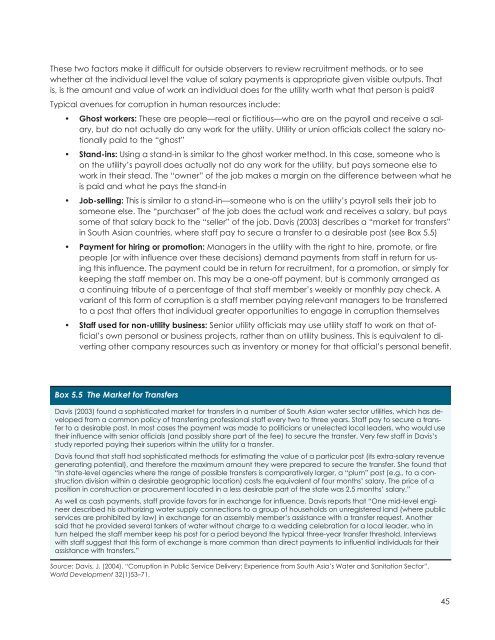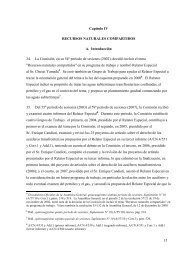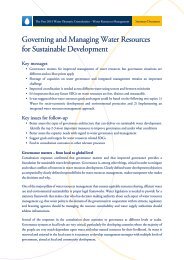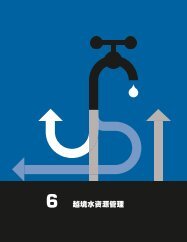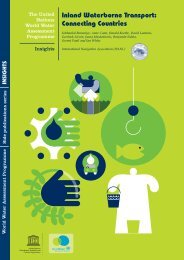A Sourcebook - UN-Water
A Sourcebook - UN-Water
A Sourcebook - UN-Water
You also want an ePaper? Increase the reach of your titles
YUMPU automatically turns print PDFs into web optimized ePapers that Google loves.
These two factors make it difficult for outside observers to review recruitment methods, or to see<br />
whether at the individual level the value of salary payments is appropriate given visible outputs. That<br />
is, is the amount and value of work an individual does for the utility worth what that person is paid?<br />
Typical avenues for corruption in human resources include:<br />
• G host workers: These are people—real or fictitious—who are on the payroll and receive a salary,<br />
but do not actually do any work for the utility. Utility or union officials collect the salary notionally<br />
paid to the “ghost”<br />
• Stand-ins: Using a stand-in is similar to the ghost worker method. In this case, someone who is<br />
on the utility’s payroll does actually not do any work for the utility, but pays someone else to<br />
work in their stead. The “owner” of the job makes a margin on the difference between what he<br />
is paid and what he pays the stand-in<br />
• J ob-selling: This is similar to a stand-in—someone who is on the utility’s payroll sells their job to<br />
someone else. The “purchaser” of the job does the actual work and receives a salary, but pays<br />
some of that salary back to the “seller” of the job. Davis (2003) describes a “market for transfers”<br />
in South Asian countries, where staff pay to secure a transfer to a desirable post (see Box 5.5)<br />
• P ayment for hiring or promotion: Managers in the utility with the right to hire, promote, or fire<br />
people (or with influence over these decisions) demand payments from staff in return for using<br />
this influence. The payment could be in return for recruitment, for a promotion, or simply for<br />
keeping the staff member on. This may be a one-off payment, but is commonly arranged as<br />
a continuing tribute of a percentage of that staff member’s weekly or monthly pay check. A<br />
variant of this form of corruption is a staff member paying relevant managers to be transferred<br />
to a post that offers that individual greater opportunities to engage in corruption themselves<br />
• Staff used for non-utility business: Senior utility officials may use utility staff to work on that official’s<br />
own personal or business projects, rather than on utility business. This is equivalent to diverting<br />
other company resources such as inventory or money for that official’s personal benefit.<br />
Box 5.5 The Market for Transfers<br />
Davis (2003) found a sophisticated market for transfers in a number of South Asian water sector utilities, which has developed<br />
from a common policy of transferring professional staff every two to three years. Staff pay to secure a transfer<br />
to a desirable post. In most cases the payment was made to politicians or unelected local leaders, who would use<br />
their influence with senior officials (and possibly share part of the fee) to secure the transfer. Very few staff in Davis’s<br />
study reported paying their superiors within the utility for a transfer.<br />
Davis found that staff had sophisticated methods for estimating the value of a particular post (its extra-salary revenue<br />
generating potential), and therefore the maximum amount they were prepared to secure the transfer. She found that<br />
“In state-level agencies where the range of possible transfers is comparatively larger, a “plum” post (e.g., to a construction<br />
division within a desirable geographic location) costs the equivalent of four months’ salary. The price of a<br />
position in construction or procurement located in a less desirable part of the state was 2.5 months’ salary.”<br />
As well as cash payments, staff provide favors for in exchange for influence. Davis reports that “One mid-level engineer<br />
described his authorizing water supply connections to a group of households on unregistered land (where public<br />
services are prohibited by law) in exchange for an assembly member’s assistance with a transfer request. Another<br />
said that he provided several tankers of water without charge to a wedding celebration for a local leader, who in<br />
turn helped the staff member keep his post for a period beyond the typical three-year transfer threshold. Interviews<br />
with staff suggest that this form of exchange is more common than direct payments to influential individuals for their<br />
assistance with transfers.”<br />
Source: Davis, J. (2004). “Corruption in Public Service Delivery: Experience from South Asia’s <strong>Water</strong> and Sanitation Sector”.<br />
World Development 32(1)53–71.<br />
45


